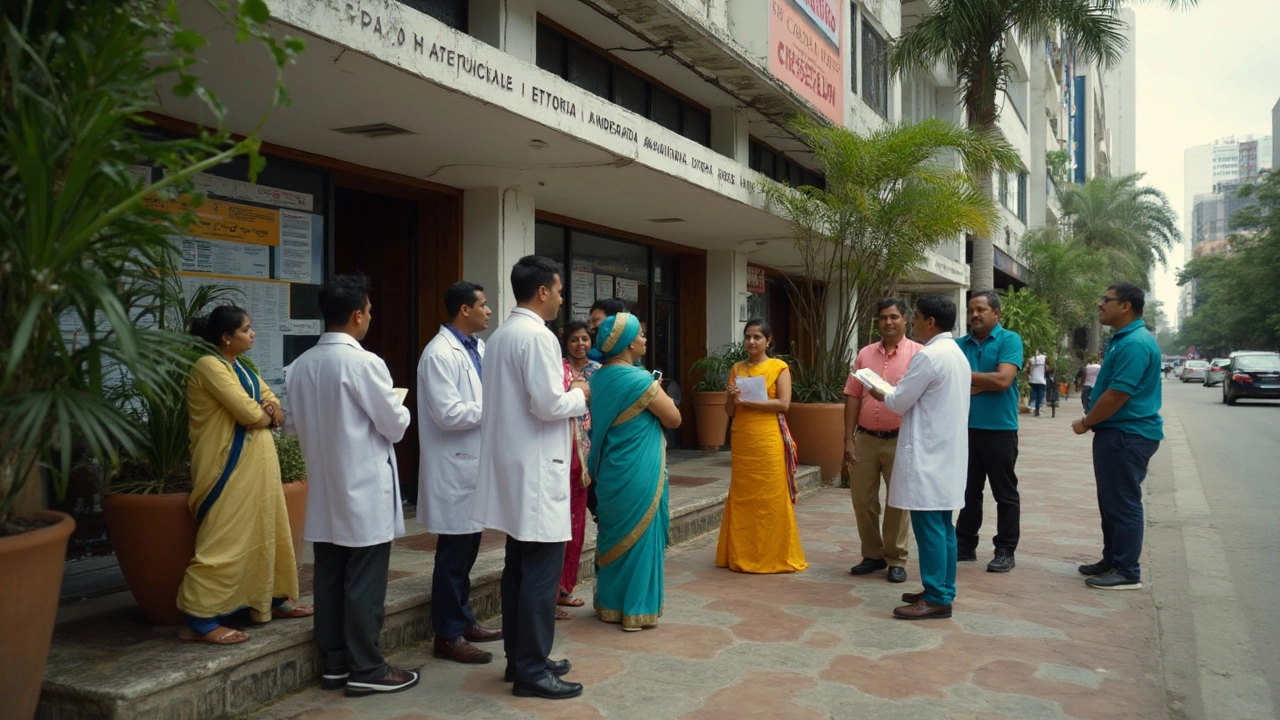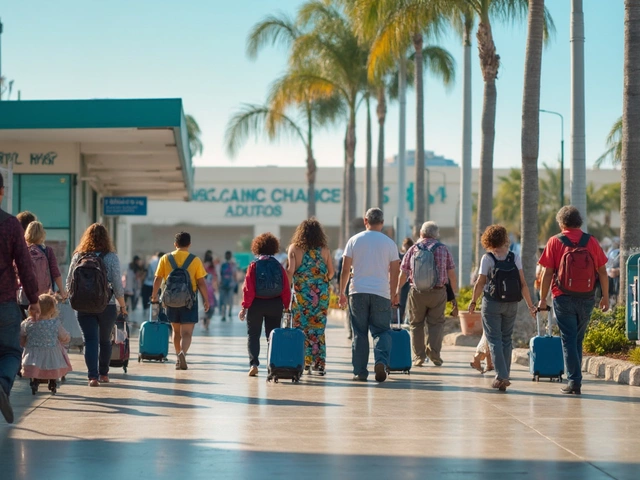You've probably heard someone mention flying to Mexico for surgery and thought, "Is that seriously safe?" The idea isn’t as crazy as it sounds—medical tourism is booming, and Mexico’s one of the top picks for people looking to save cash on procedures that can cost double or triple back home. But is it actually a good idea? Can you really trust a hospital in another country with your health?
Money’s a big reason folks head south for surgery. Some get quoted $40,000 for a knee replacement in the US, and then find out a clinic in Tijuana will do it for less than $10,000, with the flight and hotel thrown in. Sounds amazing, right? But cheaper doesn’t always mean safer. There are awesome hospitals with US-trained doctors—and there are clinics that’ll make you wish you never Googled “cheap surgery Mexico.”
If you think about it, safety comes down to the research you do. Look at hospital accreditations (like JCI or CSG), doctor qualifications, and honest reviews. Talk to folks who’ve actually gone and ask all the awkward questions you can. Don’t let flashy websites fool you—get the facts straight from the source. Think about follow-up care too, because if something goes wrong, hopping back on a plane isn’t fun.
- Why People Choose Mexico for Surgery
- The Real Deal on Safety Standards
- Risks and How to Dodge Them
- What to Check Before You Book
- Patient Stories: Wins and Nightmares
- Making a Smart, Safe Choice
Why People Choose Mexico for Surgery
There’s no doubt—cost is the first thing that grabs people’s attention. Getting a major surgery in the US, Canada, or Europe can drain your bank account, even with insurance. In Mexico, prices can be 50–70% less for the same procedure, which is game-changing for folks without great coverage or with sky-high deductibles. Plus, estimates say more than a million Americans cross the border every year for medical treatment, making it a real hotspot for medical tourism.
But it’s not just cheaper bills. Wait times for planned surgeries in the US or Canada can drag on for months. In Mexico, it’s common to get an appointment within days or a couple weeks. You can sort out your surgery and actually get it done before the next season hits back home.
The location is convenient for most Americans. Border cities like Tijuana, Mexicali, and Juarez aren’t much further than a quick flight or even a drive. So you don’t have to go far—and family can visit or stay with you with less hassle.
Also, a lot of clinics are geared towards foreigners. You’ll find staff who speak English, paperwork ready for US insurance, and recovery suites that look more like nice hotels. Some folks even combine their recovery with a bit of vacation time on the beach.
So, when people Google "Mexico surgery safety," it's not only because they want things cheap. Fast service, familiar care, and locations close to home make it a strong option—for those willing to do their homework.
The Real Deal on Safety Standards
If you want the truth about surgery safety in Mexico, it’s not as black and white as some sites make it out to be. The country has world-class hospitals right alongside clinics you wouldn’t want to touch. Here’s how you tell the difference.
The best hospitals in big cities like Mexico City, Tijuana, and Monterrey actually meet international standards. Some are even approved by the Joint Commission International (JCI), the same group that rates top US hospitals. If you spot Mexico surgery safety claims, don’t just take their word—ask for proof of JCI or the Mexican accreditation (CSG). Not every clinic is accredited, and in the smaller towns, you’ll often find more cut corners to save costs.
You might be surprised, but according to 2023 data from the Mexican Secretariat of Health, there are more than 150 hospitals in Mexico with international or national accreditation. Some clinics even advertise US-trained surgeons. Still, some shady operators thrive on the demand, especially in border towns. That’s where most horror stories start—so knowing the difference is huge.
| Type of Facility | Typical Features | Accreditation |
|---|---|---|
| JCI-Accredited Hospital | US-trained doctors, advanced equipment, follow strict protocols | JCI/CSG, often double-accredited |
| Mid-Tier Clinic | Limited English, may be cheaper, mixed reviews | National (CSG) or no accreditation |
| Budget Clinic | Bargain prices, few regulations, major risk | Usually none |
Another thing to check is the surgeon’s background. Plenty will say “board-certified,” but Mexico has several different boards, and not all are legit. Look up their credentials, check names with the Consejo Mexicano board, and ask for details about where they trained. English-speaking staff makes a real difference too—nobody wants misunderstandings in an operating room.
Be wary of clinics promising zero complications or super-fast recoveries. Real professionals will talk straight with you about risks, extra costs, and what happens if things go wrong. Good clinics have 24/7 ICU, infection control, and don’t hesitate to show you their stats. If you can, get everything in writing, including what’s covered in the price.
- Confirm hospital and doctor accreditation
- Check infection and complication rates
- Look for US or Canada training on staff
- Read real patient reviews, not just the ones on the clinic’s own site
Bottom line: the safety standard is there—you just have to be picky. It’s your body on the line, so take your time with this step.
Risks and How to Dodge Them
No one books a flight to get surgery thinking something will go wrong—but stuff happens. If you cut corners or skip the research, your "bargain deal" can turn into a total mess. Here’s what you need to know about the real reds flags and how to steer clear of them.
The biggest risks of getting surgery in Mexico are infection, botched procedures, shady clinics, and trouble getting proper follow-up care. In 2023, the CDC even put out a warning after a handful of Americans got fungal meningitis from a popular Mexican clinic. That’s scary but also rare—mostly, problems pop up from bad hygiene, fake credentials, or not enough aftercare.
| Risk | What to Watch For |
|---|---|
| Infection | Unclean facilities, reused needles, or lack of proper sterilization |
| Doctor Credentials | Fake degrees, little experience, or no accreditation |
| Poor Communication | Language barriers, vague answers, or refusal to provide details |
| Aftercare Issues | No plan for complications, hard to reach doctor, no help with follow-ups |
| Hidden Costs | Low up-front quote but expensive extras once you’re there |
Want to dodge these traps? Here’s what really works:
- Check if the hospital or clinic is accredited by global groups like JCI or Mexico’s CSG. These seals mean they meet safety rules.
- Google the surgeon. Look up their qualifications, where they trained, and reviews from other patients. Make sure you find real info, not just flashy ads or paid testimonials.
- Ask clear questions: Who’s doing the surgery? What happens if something goes wrong? Who handles aftercare? If things feel off or answers are vague, walk away.
- Get everything in writing—what’s included in the price, what costs extra, and what support you’ll get before and after you leave.
- Bring a friend or family member if you can. Having someone on your side is always helpful, especially if you hit a snag.
The golden rule? If a deal seems way too good for Mexico surgery safety, there’s probably a reason—and it’s not worth risking your health. Scrutinize everything, ask tons of questions, and don’t be afraid to say no if it doesn’t feel right.

What to Check Before You Book
If you’re thinking about getting surgery in Mexico, the stuff you check before booking makes all the difference. A little homework now can save you a lot of headaches (and money) later. Don’t just Google a clinic, look at some pretty photos, and send your deposit. Here’s what you really need to look into.
- Mexico surgery safety: Not every hospital or clinic is created equal. Look for facilities with real accreditations like Joint Commission International (JCI) or the Mexican General Health Council (CSG). These badges mean the hospital follows tough safety rules—think of them as the health world’s version of Michelin stars.
- Ask who’s actually performing your surgery. Is the doctor certified in that procedure? Mexican doctors should have certification from the Consejo Mexicano (a Mexican medical board), and many top surgeons trained in the US or Europe. If the clinic dodges questions about doctor credentials, take it as a red flag.
- Push for real patient reviews. Don’t just trust what the clinic sticks on its website. Real patients post on medical forums, Facebook groups, and Reddit. Look for specific details—the good, the bad, and the truly ugly. If you see a lot of people with the same complaints, pay attention.
- Language matters. You want your surgeon (and nurses) to speak understandable English. If you can't communicate clearly about your medical history, risks, or aftercare, that’s a problem.
- Know what’s included in the price. Sometimes “all-inclusive” just means the surgery and a one-night stay—no lab tests, no aftercare, no emergency backup. Get an itemized quote in writing. Ask what happens if you need extra care or get sick after surgery.
- Check how emergencies are handled. Does the clinic have backup plans if things go sideways? Do they have an ICU or quick access to a proper hospital? If they act vague, think twice.
One last thing—double check travel requirements. Some procedures need you to stick around longer than advertised, and flying back too early can be risky. Make sure your passport and travel documents are squared away, and talk to your regular doctor before you make the leap. Getting everything clear upfront is the best way to actually have a safe, stress-free experience.
Patient Stories: Wins and Nightmares
Look up online forums and you'll find plenty of first-hand accounts—some will make you book the next flight, others will have you running in the other direction. Here’s how things have really played out for people who tried Mexico surgery safety for themselves.
Take Anna from Texas. She had a $1,200 dental implant done in Juarez after her dentist in Houston quoted her over $5,000. She says her Mexican surgeon was US-trained, spoke perfect English, and the clean, modern clinic had better tech than her dentist’s. She only needed one extra follow-up when she got home. Anna’s story pops up a lot—people get the same or better care, save thousands, and love the results.
But it’s not all happy endings. There’s Mark from Phoenix. He went in for weight-loss surgery in Tijuana. The clinic looked great online and had a fancy website. But after surgery, he ended up with an infection and spent three weeks in a hospital back in the States. Mark had trusted a cheap deal without double-checking the surgeon’s credentials or the clinic’s reviews. His story’s not rare—serious complications come up, especially when people skip the homework.
The stats tell a real story. According to recent data published by the International Society of Aesthetic Plastic Surgery, tens of thousands of Americans travel to Mexico every year for healthcare. Most surgeries work out, but a US CDC study in 2023 linked over 20 cases of antibiotic-resistant infection to certain unlicensed Mexican clinics.
| Outcome | Reported Cases in 2023 (US Travelers) |
|---|---|
| Satisfied, no complications | ~47,000 |
| Minor Complications | 3,500 |
| Major Complications | 290 |
| Severe Infections (CDC Tracked) | 21 |
So what’s the lesson from all these wins and horror stories? If you cut corners or ignore warning signs, you’re asking for trouble. If you check doctor licenses, read real patient reviews, and stick to certified clinics, your chances of a smooth, safe experience go way up. Learn from others—don’t be a cautionary tale.
Making a Smart, Safe Choice
Let’s get down to what really matters—how do you avoid horror stories and actually land in safe hands when getting surgery in Mexico? The best move is to do a solid checkup on your own before anyone does one on you. Start by focusing on clinics and doctors who are actually certified by recognized organizations. For Mexico, that can mean the Mexican General Health Council (CSG) or global groups like the Joint Commission International (JCI). These spots stick to strict safety rules—think regular inspections, real emergency plans, and no fake diplomas hanging on the wall.
One easy way to spot a quality clinic: ask to see their certifications and doctor credentials. Don’t just settle for the front-desk answer—ask for details. Compare it against the official JCI or CSG websites to see if the place actually checks out. Popular tourist hubs like Tijuana, Monterrey, and Mexico City have multiple hospitals with international accreditations, but not all do. In fact, according to the Medical Tourism Association, around 40% of international medical tourists heading to Mexico choose cities with these kinds of standards.
For peace of mind, always look up patient reviews—good and bad. Explore forums like RealSelf, or Facebook groups focused on Mexican surgery trips. If you see stories where aftercare was ignored or communication was sloppy, that’s a huge red flag. A licensed surgeon should be open to video calls, walk you through the surgery (and possible risks), and show before-after photos with proof they’re not faked.
"Ask for the full name of the surgeon and check their credentials with the Consejo Mexicano de Cirugía, or your country's embassy. It takes five minutes and can save your life," says Dr. Ariel Ortiz, director of a major bariatric center in Tijuana.
Bring someone with you, if you can. Not only does it make recovery easier, but you also have more eyes and ears making decisions and catching any weird stuff before it becomes a problem. Arrange all travel and aftercare before your flight. If you’re staying for recovery, see if the clinic has a partnership with a recovery house or a nurse (some even offer private transport and translators).
Here’s a snapshot of things to check before you book, based on advice from actual medical travelers:
- Mexico surgery safety: Confirm hospital accreditation (JCI, CSG, or international equivalent).
- Check surgeon credentials (ask for full name, specialty, and board certifications).
- Look for third-party reviews outside the clinic’s website.
- Ask about emergency plans and infection control policies.
- Discuss aftercare and what happens if there are complications.
- Understand total cost, including extra nights, drugs, and follow-ups.
| City | # of JCI-Accredited Hospitals (2025) | Average Surgery Cost ($USD) |
|---|---|---|
| Tijuana | 7 | 6,000 – 12,000 |
| Mexico City | 10 | 5,000 – 11,000 |
| Monterrey | 6 | 5,500 – 10,500 |
At the end of the day, the best shot at staying safe is double-checking everything—and not being afraid to say no if something feels off. Your health isn’t worth gambling to save a buck. Clarity, research, and gut instinct go a long way toward making a smart, safe choice.





